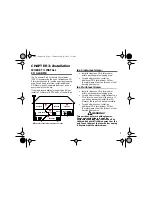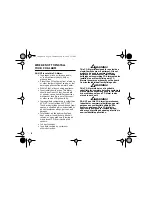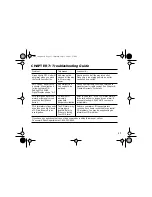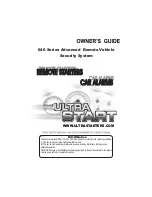
18
CHAPTER 8:
General Limitations Of CO Alarms
This CO Alarm is intended for residential use. It is not intended for use in industrial applications
where Occupational Safety and Health Administration (OSHA) requirements for carbon monoxide
detectors must be met.
CO Alarms will not work without power.This CO
Alarm requires a continuous supply of AC power.
Plug into an unswitched 120V AC outlet only.
This CO Alarm will not sense carbon monoxide
that does not reach the sensor. This CO Alarm
will only sense CO at the sensor. CO may be
present in other areas. Doors or other obstructions
may affect the rate at which CO reaches the CO
Alarm. For this reason, if bedroom doors are
usually closed at night, we recommend you install
a CO Alarm in each bedroom and in the hallway
between them.
CO Alarms may not sense CO on another level
of the home. For example, a CO Alarm on the
second level, near the bedrooms, may not sense
CO in the basement. For this reason, one CO
Alarm may not give adequate warning. Complete
coverage is recommended. Place CO Alarms on
each level of the home.
CO Alarms may not be heard. The alarm horn
loudness meets or exceeds current UL standards
of 85 dB at 10 feet. However, if the CO Alarm is
installed outside the bedroom, it may not wake up
a sound sleeper or one who has recently used
drugs or has been drinking alcoholic beverages.
This is especially true if the door is closed or only
partly open. Even persons who are awake may not
hear the alarm horn if the sound is blocked by
distance or closed doors. Noise from traffic,
stereo, radio, television, air conditioner, or other
appliances may also prevent alert persons from
hearing the alarm horn. This CO Alarm is not
intended for people who are hearing impaired.
CO Alarms are not a substitute for a smoke
alarm. Although fire is a source of carbon
monoxide, this CO Alarm does not sense smoke
or fire. This CO Alarm senses CO that may be
escaping unnoticed from malfunctioning furnaces,
appliances, or other sources. Early warning of fire
requires the installation of smoke alarms.
CO Alarms are not a substitute for life
insurance. Though these CO Alarms warn against
increasing CO levels, BRK Brands, Inc. does not
warrant or imply in any way that they will protect
lives from CO poisoning. Homeowners and renters
must still insure their lives.
CO Alarms have a limited life.Although the CO
Alarm and all of its parts have passed many
stringent tests and are designed to be as reliable
as possible, any of these parts could fail at any
time. Therefore, you must test your CO Alarm
weekly.
CO Alarms are not foolproof. Like all other
electronic devices, CO Alarms have limitations.
They can only detect CO that reaches their
sensors. They may not give early warning to rising
CO levels if the CO is coming from a remote part
of the home, away from the CO Alarm.
M06_1040_001.E Page 18 Thursday, July 13, 2000 7:57 AM


































